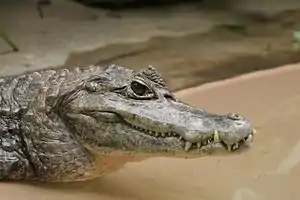caiman
English

A spectacled caiman
Alternative forms
Etymology
From Spanish caiman or Portuguese caimão, probably from Galibi Carib acayouman[1], or perhaps from a Congo language[2] or from Piapoco chamàna.
Pronunciation
- IPA(key): /ˈkeɪ.mən/
- Rhymes: -eɪmən
Noun
caiman (plural caimans)
- Any of the relatively small crocodilians of genus Caiman, within family Alligatoridae.
- 1995, Laurie Agopian, Extended Thematic Unit: Rain Forest, page 32,
- Caimans are reptiles that are closely related to their Central and South American neighbors, the alligators. Adult caimans are usually four to six feet (1.8 m) in length.
- 2002, International Wildlife Encyclopedia: Brown bear - Cheetah, 3rd Edition, page 358,
- The caimans are found in South America, mainly in the Amazon basin, with one species extending into the southern part of Mexico and another reaching northern parts of Argentina.
- 2010, Carrol L. Henderson, Mammals, Amphibians, and Reptiles of Costa Rica: A Field Guide, page 164,
- Newly hatched caimans eat insects. Young caimans are eaten by Jabirus, Wood Storks, Great Egrets, and raccoons. Adult caimans have no predators except human poachers.
- 1995, Laurie Agopian, Extended Thematic Unit: Rain Forest, page 32,
- A semi-aquatic lizard, of the genus Dracaena, found in South America. To differentiate from caimans, they are referred to as caiman lizards.
Derived terms
Translations
alligator relative
|
|
References
- “caiman” in Dictionary.com Unabridged, Dictionary.com, LLC, 1995–present.
- “caiman” in Douglas Harper, Online Etymology Dictionary, 2001–2019.
Catalan
This article is issued from Wiktionary. The text is licensed under Creative Commons - Attribution - Sharealike. Additional terms may apply for the media files.